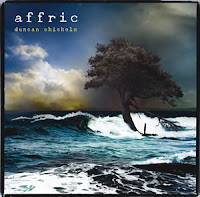The Strathglass Trilogy: Farrar, Canaich and Afffric
I have been listening to Duncan Chisholm's new album, called Affric. It is a great selection of tunes.
I am a great fan of Duncan's music and regularly play his tracks on my weekly radio show, Acoustic and Eclectic, on Pulse Community Radio [available on 98.4FM where I stay, if there isn't a hill in the way, and www.pulseonair.co.uk everyway and everywhere].
He is a brilliant fiddler, a great exponent of Highland slow airs, and this album follows on from his previous releases; Redpoint, The Door of Saints, Farrar and Canaich.
He is a good interpreter of others material [especially Phil Cunningham's slow pieces] and is developing as a composer, contributing 11 tunes to the last three albums and taking on a role as soundtrack artist on some recent TV projects.
However, [that word again], I struggle a bit with the idea that the last three albums [Farrar, Canaich and Affric] now constitute a trilogy; the Strathglass trilogy.
I understand that the artist "drew inspiration from one of the world's most beautiful wilderness areas" and "felt compelled to produce soundtracks to these places that I have loved all my life", as stated in the booklet for Affric. I think these statements fit as well with the ideas expressed,or the recollections of a place in a single tune as much as a trilogy of CDs. Each composition is that expression and an album might simply be a collection of such sentiments and emotional and intellectual expressions.
The three albums do share common design features; the same lower-case titling, the use of the same font throughout, the identical CD insert features; the pictures, track listings and credits. Another attempt at a unifying element is the use of quotations form the Neil Munro poem, To Exiles.
To Exiles was written in 1899 and refers to Scots living abroad who might be missing the storms and rain of home. Neil Munro, in a letter of 28th March 1902, states, " I was thinking particularly of some Fife towns I know (but it applies to any narrow straggling sea-side town) and they seemed to me really more the property of the sea than of the land - stoney billows, so to speak, cast upon the shore" [Bagpipe Ballads and Other Poems, 2010, Page 31].
The quote used in Farrar is correctly lifted from the poem:
Wild cries the winter, loud through all our valleys;
The midnights roar, the grey noons echo back.
The quote in Canaich is nearly right:
Let the torrents pour and the great winds rally
Let lightning strike the pine.
It should be:
Let torrents pour then, let the great winds rally
Snow-silence fall or lightning blast the pine;
The quote in Affric is a mish-mash of several lines:
Firstly,
The rains may thrash on us
The great mists blind us
and lightning rend the pine tree on the hill
Yet the morning shall find us
Children of tempest all unshaken still.
Should be:
Though rains may thrash on us, the great mist blind us
And lightning rend the pine-tree on the hill
Yet are we strong, yet shall the morning find us
Children of tempest unshaken still.
Then,
And exiled son of scotland
it is yours this rude country
where your fathers sleep
it is yours and you are ours for ever-more
This part is a mixture of unrelated lines.
Let torrents pour then, let the great winds rally
Snow-silence fall or lightning blast the pine;
That light of Home shines warmly in the valley
And, exiled son of Scotland, it is thine.
and
Far have you wandered over seas of longing,
And now you drowse, and now you may well weep,
When all the recollections come a-thronging,
Of this rude country where your fathers sleep
and later
Fond are our hearts although we do not bare them, -
They're yours, and you are ours for evermore.
To me, a poem of recollection, longing and nostalgia about a sea-side town does not quite tally with a set of tunes relating to and praising a remote Highland setting of lochs and glens. The reconstruction of this poem is, in one respect, self-serving and lazy; in its proper form it is not a rallying call to arms as suggested. It is not about the clans, of clearances, of the Highlands. The unification of the albums around the words doesn't work. In the last part of the trilogy the set of words are fractured and put together to form new and different ideas - they are not Munro's.
But... the music is brilliant in evoking these themes and sentiments. The tunes, the playing, the sound, the arrangements. They are perfect in themselves. They just don't match with To Exiles.

